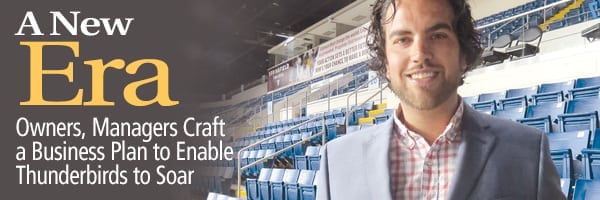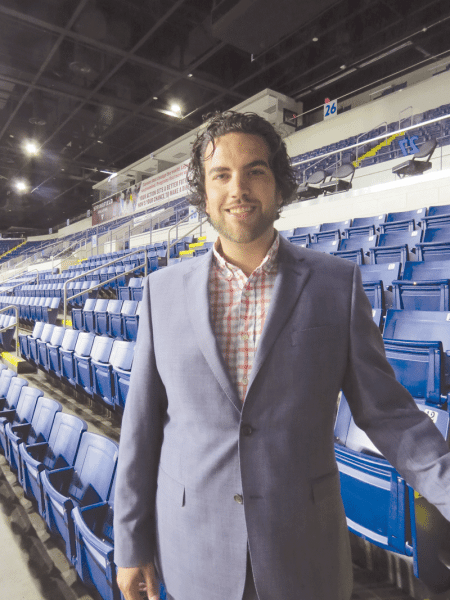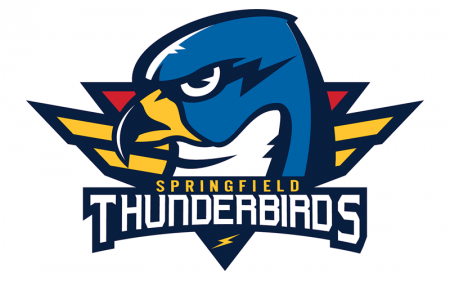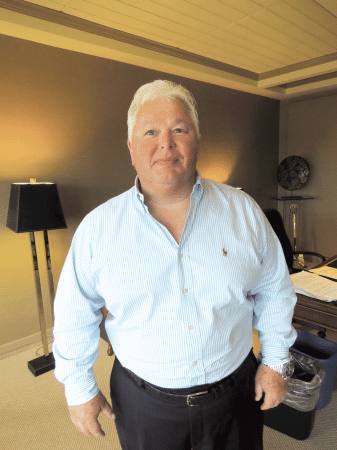
Owners, Manager Craft a Business Plan to Enable Thunderbirds to Soar
A New Era

Nate Costa
After a two-month hiatus, professional hockey is back in Springfield, with a franchise recently named the Thunderbirds. Its executive vice president and large ownership group are confident this team can get over the attendance hump that has plagued previous franchises in the City of Homes, and say this confidence stems from an intense focus on sales coupled with the commitment — and connections — of the 26 owners.
Nate Costa had what most people would consider an attractive position with the American Hockey League — with the operative word being had.
As a member of the AHL’s Team Business Services Department, Costa had a broad job description, but essentially he worked with all 30 of the league’s teams to improve revenues and attendance and deploy best practices to help their organizations run more efficiently and profitably. It was a job that took him across the country, to cities ranging from San Diego to Grand Rapids, Mich., to Utica, N.Y., and provided a host of learning opportunities.
But while Costa, a Springfield native and Cathedral High School graduate, enjoyed that work, he coveted another title and a much different set of job responsibilities.
“I really wanted to run a franchise, and I entered the job with the AHL with that goal in mind,” he told BusinessWest, adding that achieving this career ambition would provide him with an intriguing opportunity to put to work many of the lessons learned while working with and for teams like the Hershey Bears, Syracuse Crunch, Utica Comets, and Wilkes-Barre Scranton Penguins.
And now, thanks to the dramatic turn of events that brought the Portland (Maine) Pirates franchise to Springfield this spring, he’ll get that chance. Indeed, Costa was recently named executive vice president of the team, recently renamed the Thunderbirds.
It’s been a whirlwind month or so for Costa; he got married just a few weeks ago, and officially started his new job at the same time. He doesn’t have an office yet — a new lease with the MassMutual Center doesn’t begin until July — or even business cards. Meanwhile, most of his time, and that of the new ownership group, has been spent on matters of business, such as franchise agreements, negotiating with the MassMutual Center, and choosing a team name, logo, and colors.
But Costa told BusinessWest that the real work of running this franchise and doing what the previous ownership group could not — move the team out of last place, at least when it comes to attendance — is underway.
When queried about how he intends to improve the numbers at the gate as well as the overall profitability of Springfield’s AHL franchise — a question posed repeatedly and in several different ways — he said, in essence, that it comes down to one word: selling.
He would elaborate, of course, touching on both what is to be sold and, especially, how and to whom.
As for the former, he said the product is much more than hockey, although that’s obviously a big part of it. He preferred to say that the team would be selling “an experience” that could be enjoyed by all members of the family.
 As for the latter, he said the selling would take on a far more aggressive tone than it has historically, with a specific focus on season tickets and group sales, strategic targets that have yielded success for other franchises, as we’ll see later.
As for the latter, he said the selling would take on a far more aggressive tone than it has historically, with a specific focus on season tickets and group sales, strategic targets that have yielded success for other franchises, as we’ll see later.
Dennis Murphy, owner of the Ventry Group and a member of the ownership group, summed things up this way:
“To compare what’s happened in the past to what this situation looks like would be to compare a shovel to a bulldozer,” he explained. “This is the most powerful sales force ever assembled in any part of Western Mass., bar none.”
Overall, Costa said the Thunderbirds won’t really do anything the previous franchise didn’t do — it will just do it better and more aggressively, with the goal of creating more and stronger connections between the team and the community.
And it will also do it with the backing of 26 local owners, all of whom are committed to hockey, this team, and selling it (there’s that word again), said Paul Picknelly, president of Picknelly Enterprises, who is among that group.
“We now have 26 owners,” he noted, saying that number slowly and with added emphasis to convey strength in numbers. “That, in itself, is a huge positive change in the way we sell hockey across the region.”
Picknelly said the ownership group is diverse — from Tony Caputo, owner of the Red Rose Group, to Peter Martins and Derek Slema, who both own of a number of Dunkin’ Donuts franchises across the region — and they will use these businesses, and their skill sets, to help bring visibility to the team and fans to the MassMutual Center.
For this issue, BusinessWest talked at length with Costa and others about the Thunderbirds franchise and how the new ownership group and leadership team plan to take hockey to new heights in Springfield.
Dropping the Puck
Looking ahead, Costa noted, while the AHL’s 2016-17 schedule is not yet official, he knows the Thunderbirds, the affiliate of the National Hockey League’s Florida Panthers, will start the campaign on the road.
That’s good in many respects, he said, because it will give the team another week to get ready for opening night (Oct. 22) — seven days that will certainly be needed.
Indeed, the new ownership group and leadership team will be compressing a process that usually begins the day after the season ends, and actually long before that — Costa said roughly 80% of ticket packages for the ‘next’ season are sold while a team is still playing games — into a much shorter time frame.
But that’s just one more element to an already imposing and multi-faceted challenge, one the energetic 33-year-old certainly embraces.
Costa has taken an interesting path to this point in his career. A journalism major at Northeastern, he found employment opportunities in that field few and far between. While searching for one in the fall of 2006, he instead decided to join a classmate at Cathedral who had recently become one of the first salespeople hired by the new AHL franchise in San Antonio, owned by that city’s hugely successful NBA franchise, the Spurs.
“My original thought was to go down there, cut my teeth, learn some things, and eventually get back to the public-relations or writing side of things,” he explained. “But I ended up loving what we were doing; we were starting a team from scratch in San Antonio, and I got to see that on a day-to-day basis.”
Tasked with selling season tickets, corporate partnerships, and group packages, Costa said he could see momentum build for the sport and the team in a city that could never be described as a hockey hotbed.
“I saw over the course of my three and half years with the club that we were making a real impact,” he said, using that phrase to describe both the efforts of the sales team on the club as they related to the team’s success, and the franchise’s work to become a force within the community. “The hockey piece kind of sells itself, but we had to find a niche to get people out to the building and experience this sport for the first time; we centered on connecting with the community, connecting with kids, showing them experiences at the building and through our games that they couldn’t get from going to a San Antonio Spurs game, and providing them access they couldn’t get with the NBA.
“This opened my eyes to the difference between the, quote, unquote, minor leagues and the professionals,” he went on, “and the cool things you could do from a community-connectivity standpoint with our league.”
Costa’s success in San Antonio — he was one of the top performers on a sales team that won awards from the league for highest group-sales growth — led him to be recruited by the head of the Team Business Services Department formed a few years earlier to help franchises develop and share best practices.

Paul Picknelly says the ability to leverage the talent and resources of 26 local owners is a huge benefit for Thunderbirds management.
“We were sharing revenue streams as a league, so the AHL was able to identify teams that were having success and teams that were doing really good things, and we were able to share that across the league,” he said, adding that he joined that department in 2009 and thoroughly enjoyed his seven years in a role he described as part support system, part consultant.
But, as mentioned earlier, a career goal he set some time ago was to one day manage a team of his own.
“I viewed that opportunity with the American Hockey League as a chance to get my Ph.D. in sports business,” he explained. “I spent the past six and half years working closely with our other owners and presidents, helping them to improve their businesses, while also being completely entrenched in what works from an AHL perspective; it was a great learning ground for me.
“It got to the point where I wanted to see if I could actually enact all the things we talked about on a regular basis and helped our teams with,” he went on. “The ability to do so here in Springfield was very intriguing to me. I had worked with them over the course of time, I’ve seen opportunities, and there were things I wanted to see if I could make a difference with.”
Seeking Net Results
Looking forward, Costa said the challenge facing him, his management team, and the ownership group is not exactly the same as the one he encountered in San Antonio, but there are many similarities.
Professional hockey is certainly not new to Springfield — there has been an AHL team in the city since Calvin Coolidge was in the White House — and the sport of hockey is much more entrenched in the Northeast than it is in the Southwest. But in most respects, this is a new team and a new business, said Costa, adding that, as in San Antonio, he intends to improve attendance and profitability by building season-ticket and group sales and strong connectivity to the community.
He said this is not exactly a new strategy — those managing the former Springfield Falcons used the same words as they discussed their work — but efforts will take on a new sense of urgency and higher level of intensity.
Both will be needed, he acknowledged, to get the team over an attendance hump that has been a formidable obstacle for many years now. Indeed, while he didn’t have the figures at his disposal, Costa knew the Falcons were either last or just ahead of the Portland franchise when it came to average game attendance last season, a statistic that ultimately drove the previous ownership group to sell the team to the parent Arizona Coyotes, which moved it to Tucson.
To bring those numbers up significantly, the management team intends to first create that ‘experience’ mentioned earlier and then sell it to families, groups, the business community, and the region as a whole — the basic road map used in San Antonio and other cities, he noted.
“The game plan is to take pieces of everything I’ve learned over the last six and half years and put those together to form a business plan that’s going to have success here in Springfield,” he explained. “Though there is a rich hockey history in Springfield, with this being a charter member of our league, we’re essentially starting a business from scratch.”
When asked about specific elements of that business plan, Costa said most involve developing what he called a “sales-focused mindset” and a service-oriented approach to everything the team does.
And while all types of sales are important, including season tickets and walk-ups, group sales are usually the prime mover for franchises in this league, and for many reasons.
“What really drives our business and what fuels revenues is the group-ticket side of the business,” he explained. “This involves getting out into the local community and selling tickets to groups that are going to come out on a regular basis and participate in our games, have a good time, and, hopefully, expose new people and new kids to the experience we provide and create fans for a long time moving forward.”
If a sellable experience can be created, he went on, as well as solid connections with the community, then the franchise can succeed whether it is at the top of the standings, the middle, or even the bottom.
“We have markets that are successful even though the team isn’t winning,” he noted, adding that winning is obviously preferable. “That happens because you create an environment that shows that value to people, and there’s an experience that goes well beyond wins and losses on the ice. And that’s going to be the plan — creating a season ticket that people can see value in.”
Model Franchises
Costa said he’s optimistic the new franchise can soar higher than previous teams in Springfield because he’s seen a number of success stories in similar markets — models that can be effectively emulated.
He pointed, for example, to what’s happened in Hartford, with its Wolf Pack, an affiliate of the NHL’s New York Rangers, and a team he worked with extensively in his role with the AHL.
“Since coming back into the market as the Hartford Wolf Pack, they’ve had a great group there that has focused on tickets,” he explained, adding that, while this sounds obvious, it’s actually not. “We laid out a plan for them on where they needed to focus, and on finding more ways for them to connect with their local community at their arena. If you were to visit there, you’d see that they’ve done a great job with their building and with creating an experience and that interconnectivity — and that’s what we’re looking to do.”
The team in Providence, long called the Reds, but more recently the Bruins (because it’s an affiliate of the NHL team in Boston), is another example.
“They’re very driven from a sales perspective, and they’re one of the best at doing that,” Costa explained. “They have a full-on sales force making out-bound connections with their community. If you go to a Providence Bruins game, you see groups connected to their games constantly, from the national anthem through to everything else; they do a great job of utilizing the space that they have to sell tickets.”
Another thing those franchises do well that the Thunderbirds must emulate is getting fans to do much more than turn out for games, said Costa.
Elaborating, he said very successful teams work hard to get their fan base, and especially those who purchase season tickets, engaged, a verb he would explain in some detail.
“Selling season tickets just for the sake of selling season tickets is fantastic, but if people aren’t using those tickets and they’re not going to the games and getting that experience, then you’re not getting full benefit from those sales,” he explained. “You want people who are engaged, who are ambassadors that feel a connection to the organization that they won’t get anywhere else. That’s something I want to create.”
Moving forward, while the team is several months and perhaps a full year behind the schedule it would like to be on with regard to all the initiatives described above, it does have a few things working for it for next season and beyond.
First, it is now the only AHL franchise left in Massachusetts after Worcester lost its team, said Picknelly, noting that the Thunderbirds will attempt to effectively widen their circle of influence and bring in fans from across the state and especially from Worcester west.
Meanwhile, MGM’s $950 million casino is expected to bring several thousand people to Springfield each day, while also providing an attractive incentive to those planning meetings and conventions to take their events to Greater Springfield. Thus, the casino has serious potential to bring more families and groups to the MassMutual Center for individual games, said Picknelly.
But easily the biggest asset the team has moving forward is that large — and local — ownership group, he went on.
It translates into 26 people (all of them successful business owners in their own right) passionate about hockey in this region, committed to making it work, and willing to use their businesses and any other means available to them to promote the team and get fans to the games.
“These owners will be looking upon their local professional hockey team in a different way than they have in the past,” he explained — a natural sentiment when one is making an investment in that franchise. “For example, myself and two other owners own four of the five hotels in downtown Springfield; we’re going to sell hockey differently than how we did it in the past in our hotels.”
The same is true of all the owners, including the Dunkin’ Donuts franchise owners, he went on, adding that their stores are visited by more than 250,000 people a week, customers who will likely be exposed to the new hockey franchise in some way during those visits.
Murphy agreed, noting that the team will benefit from that new and expanded sales force he described, coupled with that large and local ownership group — a powerful combination, in his estimation.
“This sales force will work hand in glove with 26 of the most successful business owners in the Pioneer Valley,” he went on. “You can’t possibly overstate our ability to leverage these relationships.”
Bottom Line
As he sought to sum up what he described as a “new era” for hockey in this region, Picknelly chose to relate an e-mail he received from an individual who wants to join the new ownership team and likely will.
“He said he spent the last few nights sleepless, thinking about ways to sell hockey,” Picknelly recalled, adding that just about everyone already in this ownership group has probably done the same thing.
Sleepless nights do not directly correspond to success at the box office, he implied, but they do convey energy, commitment, and, most importantly, passion.
Both he and Costa believe those traits, and especially the last one, will enable the Thunderbird franchise to fly as high and fast as its namesake, and reach new heights.
George O’Brien can be reached at [email protected]





